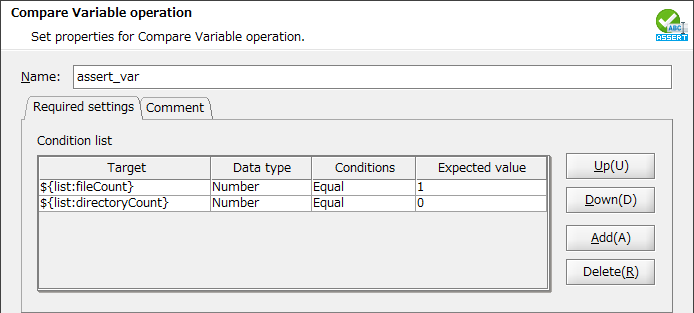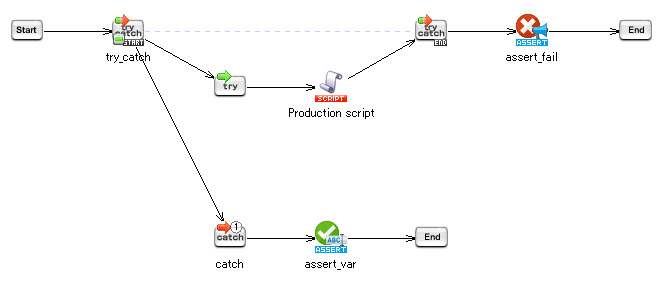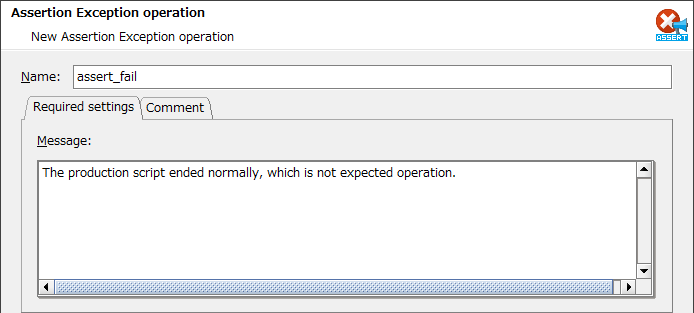 A test project is displayed with a green icon
A test project is displayed with a green icon  to distinguish from normal projects.
to distinguish from normal projects.
 For more details on advantages of using the framework, refer to “Testing Script”.
For more details on advantages of using the framework, refer to “Testing Script”.
| Function | Purpose |
|---|---|
| Test project | Separate production projects from tests |
| Call script of other project | Test a production script before registering as service |
| Assertion adapter | Verify data |
| Batch run scripts | Execute tests |
| Output test result report | Automated reporting |
| Term | Description |
|---|---|
| Production script | Script to be used in service operation. |
| Production project | Project to be used in service operation. |
| Test script | Script to test production scripts. |
| Test project | Project to test production projects. It has functions specialized for testing. |
 Refer to “Service Development” for the development phase and refer to “Service Operation” for registering services.
Refer to “Service Development” for the development phase and refer to “Service Operation” for registering services.
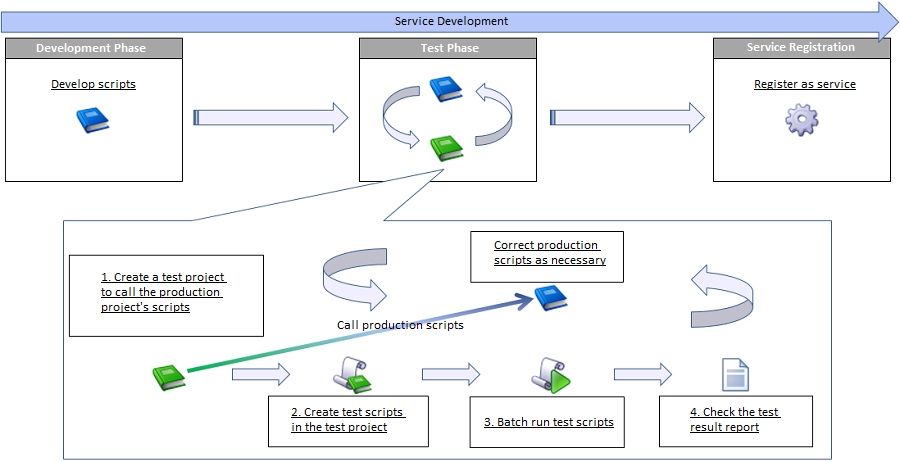
| No. | Item | Description | Corresponding function |
|---|---|---|---|
| 1. | Create test project | Create a test project to test scripts of a production project. | |
| 2. | Create test script | Create test scripts which call the developed production scripts and describe tests.
Also, correct some production scripts as necessary. |
|
| 3. | Batch run test scripts | Batch run the test scripts created in No.2 of the project. | |
| 4. | Check test result report | Check the contents of test result report generated by the batch run in No.3.
Correct some test scripts and production scripts according to the result. |
 A test project is displayed with a green icon
A test project is displayed with a green icon  to distinguish from normal projects.
to distinguish from normal projects.
 About test project
About test project
In a test project, you can use the following dedicated functions to support testing a project.
|
 Relationship between production project and test project
Relationship between production project and test project
There is no functional restriction that production projects and test projects must be one-to-one relationship. However, we recommend one-to-one relationship because it provides some administrative advantages. When a production project is “PRJ-001” and the test project for that is “PRJ-001_TEST”, you can understand the test target immediately. |
 Various assertion methods can be considered depending on the structure of production script. A part of that is introduced in “Test Patterns” section.
Various assertion methods can be considered depending on the structure of production script. A part of that is introduced in “Test Patterns” section.
 Calling script of other project
Calling script of other project
As a script of another project can be called, you can test a production script before service registration (under development). In so doing, you can detect problems in earlier phases.  For more details on the function, refer to “Call Script”. For more details on the function, refer to “Call Script”.
|
| Item name | Description | Remarks |
|---|---|---|
| Script list | List the test scripts in project. |
|
| Script list/Target | Select whether or not to test each script.
|
|
| Script list/Script name | The test script name is displayed. | |
| Script list/Execution result | The execution result of the test script is displayed.
The execution results are the following.
|
|
| Specify type | Select whether or not to specify “Type” for test script batch run.
|
|
| Specify type for execution | Select or enter a type for test script batch run. |
|
| Use default type when specified type is not found | Select whether or not to use the default type when the specified type global resource is not found.
|
|
| Run | The scripts of which [Target] is [Checked] are batch executed. |
|
| Stop | Stop batch running scripts. |
|
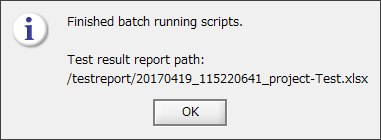
 Batch running scripts
Batch running scripts
The advantage of batch running scripts is to batch execute the test scripts in a test project and output the test result without registering the project as a service. You can batch run only from Designer.  The test result report will be output only when scripts are batch executed. The test result report will be output only when scripts are batch executed.
|
 Test result reports are not deleted automatically. As that will occupy the disk space, it is recommended to delete them periodically.
Test result reports are not deleted automatically. As that will occupy the disk space, it is recommended to delete them periodically.
| Item name | Description | Remarks |
|---|---|---|
| Project | The project name batch executed is output. | |
| Script | The script name batch executed is output. | |
| Result | The execution result of script is output.
|
|
| Message code | The message code is output when the result is “Failure” or “Error”. | |
| Error message | The error message is output when the result is “Failure” or “Error”. | |
| Execution ID | The execution ID of script is output. | |
| Exit status | The exit status of script is output. | |
| Execution time (seconds) | The execution time of script is output in seconds. |
 Outputting test result report
Outputting test result report
A test result report is assumed to be used as is for the verification result (evidence) of the test phase. |
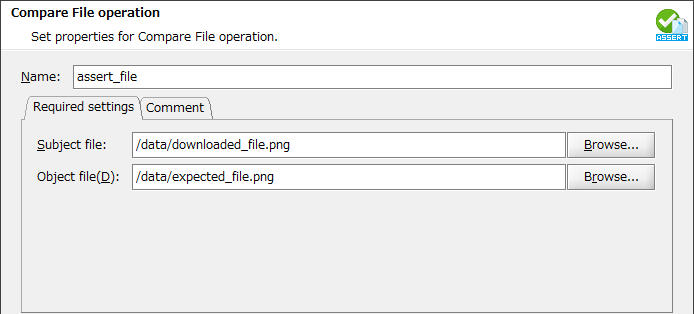

 As you can specify the result data of table model type component in the input data of Compare Table Model operation, writing to a temporary file is not needed for assertion.
As you can specify the result data of table model type component in the input data of Compare Table Model operation, writing to a temporary file is not needed for assertion.
| ID | Date | Number |
|---|---|---|
| ID001 | 2017-01-01 | 500 |
| ID053A | 2017-02-02 | 1200 |

ID001,2017-01-01,500 ID053A,2017-02-02,1200
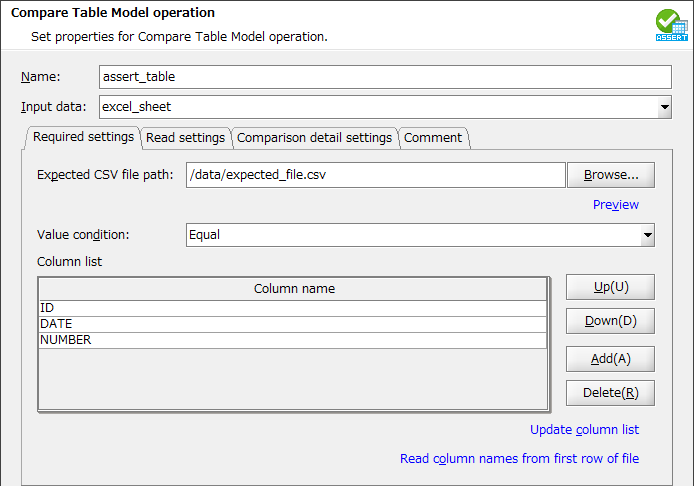
ID,2017-01-01,500 ID,2017-02-02,1200
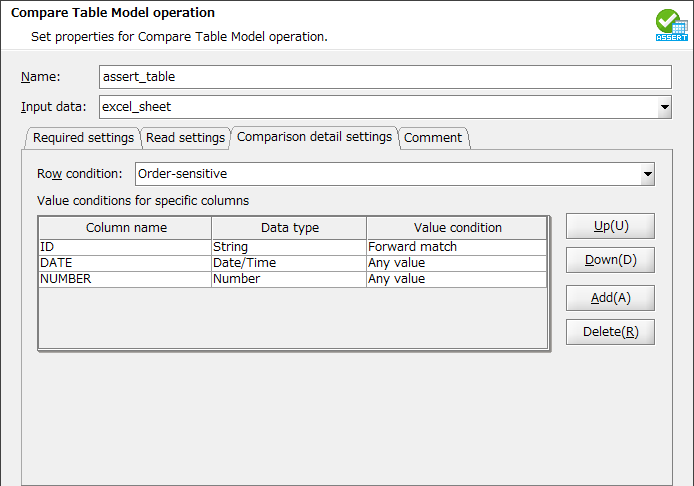
 For more details on conditions, refer to “Compare Table Model”.
For more details on conditions, refer to “Compare Table Model”.

 Delete the files under the output directory beforehand to prevent from influence of other tests.
Delete the files under the output directory beforehand to prevent from influence of other tests.
